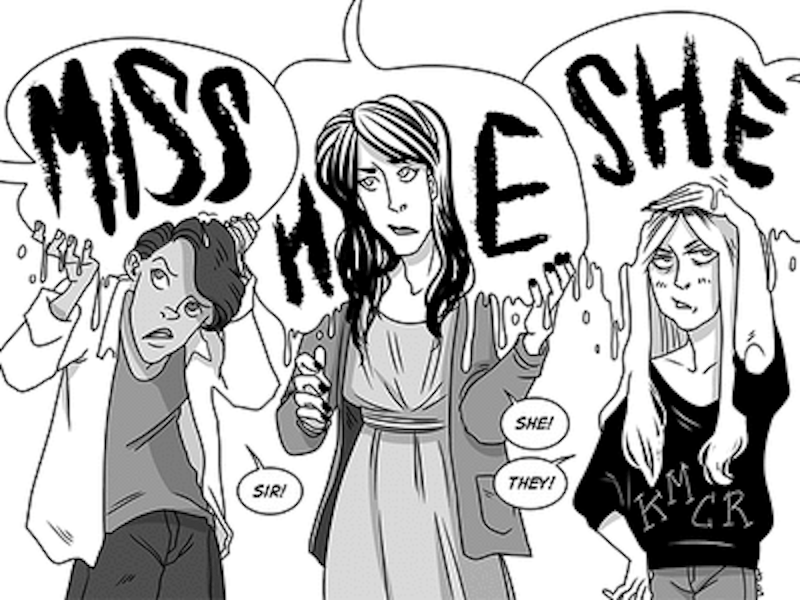After lambasting the news media last week for its reprehensible coverage of the hate crime against Kathy Sal, I remained touchy for days. Even now, I’m prickly about my pronouns—far more than I was two weeks previously. This is incredibly important to me and almost every other trans person alive, but at the same time, there are certain ways and contexts in which it’s also not a big deal. Let me try to explain.
Western culture places an inordinate amount of emphasis on how much we all “pass” as our assigned gender; men are teased for appearing girly, and women are openly mocked for “looking like a man.” I’m sure many of you cis folks have felt anxiety over being accepted as your gender, even if you didn’t recognize it as such at the time. It’s understandable; that sort of ostracism cuts to the core of your identity and sense of self-worth. Not belonging, we’ve been taught, denotes ugliness and lack of worth.
Now imagine that you fundamentally do not click with the gender you were assigned at birth, yet you bear its markings still: a man’s beard and baritone, a woman’s breasts and build. (”Passing” trans folks can still be misgendered, obviously, but bear with me for simplicity’s sake.) Suddenly, every time you’re mentioned in the third person, it’s straight-up wrong. People aren’t talking about you, they’re referring to the idea of you that’s reinforced by your physical presence. You don’t “pass” as your true self. Your identity is invalidated by the realities of your body.
Simply put: it’s depressing.
But now let’s introduce a soothing poultice you can put on the soul-sore caused by misgendering. It’s easy! When friends call you by a pronoun that matches your gender identity, all of a sudden, you feel more at ease. Your sense of discomfort in your own body remains, but it’s easier to deal with when family and loved ones are recognizably on your side. Even if you’ve still got that stubble or stubborn D-cups that just won’t bind right, the act of having your identity validated by an outside source is tremendous—especially when you compare it to the alternative.
This is why accuracy is so important: by using someone’s personal pronouns properly, you implicitly affirm their identity. By misgendering that person, though, you reject it. This is why many of us get so fed up with people in our lives who parrot the same excuses ad infinitum: “It takes some getting used to.” “You’ll always be [deadname] to me.” “Stop overreacting, s/he didn’t mean anything by it.” Misgendering doesn’t have to be intentional to be harmful, and after a certain point, the trans person or people in your life are going to get fed up with it.
That said: misgendering someone is a thing that even the best of us do sometimes. I’ve been guilty of misgendering good friends of mine, people I’ve talked with extensively and who I’ve only ever known as trans or nonbinary. After being conditioned all our lives to pick up on small gender-related “tells,” it’s bound to happen. I misgendered a girl I was crushing on not long ago. I don’t know if I’ll ever be able to describe the mortification I felt at that moment; luckily, it’s very difficult to throw oneself out of a subway car.
But when you misgender someone (and statistically, you will), the proper response is not to freak out like you accidentally shanked an infant in the eye socket. Drawing attention to the mistake only means the other party has to dwell on it longer to ease your guilt. All you need to do is look them in the eye, apologize, and repeat what you were saying with the correct pronoun. If you never asked what their pronouns were in the first place (more fool you), now’s a great opening to do so. Show you care by quietly resolving to do better, not by making a scene so that your trans friend feels uncomfortable (well, more than they already probably are).
I’ve only just started to speak up about my pronouns, and though it feels like an uphill battle sometimes, I have to remind myself that it really hasn’t been that long. Changing long-time acquaintances’ perceptions of you really does take time, and though I’m impatient to mold how the world reacts to my existence, I recognize that I sometimes need to be a little more serene about it. (Being somewhat fluid about my gender doesn’t help, but even when I’m feeling more gender-neutral, I generally accept “she” pronouns rather than “they”; at least it’s not the hated male set.)
A couple of weeks ago, at Thanksgiving dinner, I was repeatedly misgendered by my family, and for the most part I just had to grin and bear it. Most of them had just found out what was going on a week or two beforehand, and hadn’t seen me in quite some time, so I knew this was not the right occasion to cause a scene—even after my aunt looked me up and down and said “This is going to take some getting used to!” But a few hours later, sitting next to her on the couch, an accidental “he” fell out of her lips—upon which my aunt turned swiftly to me and said “Oh, I’m sorry. She,” and continued her story.
Misgendering is a pervasive and harmful beast that infests all of us at some point, and one that preys on the most basic of transgender insecurities. But take a tip from my aunt: if we own and learn from our mistakes, we can build all manner of new, loving bridges together.
—Follow Sam Riedel on Twitter: @SamusMcQueen

